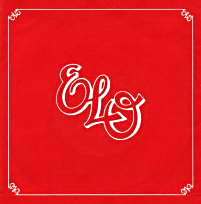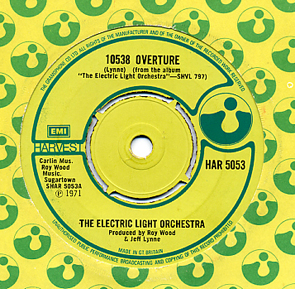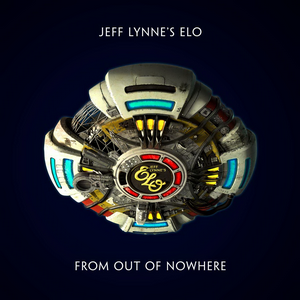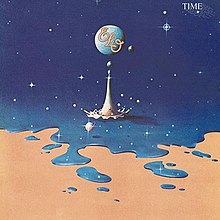
The Electric Light Orchestra (ELO) are an English rock band formed in Birmingham in 1970 by songwriters and multi-instrumentalists Jeff Lynne and Roy Wood with drummer Bev Bevan. Their music is characterised by a fusion of pop and classical arrangements with futuristic iconography. After Wood's departure in 1972, Lynne became the band's sole leader, arranging and producing every album while writing nearly all of their original material. From this point until their first break-up in 1986, Lynne, Bevan, and keyboardist Richard Tandy were the group's only consistent members.

Jeffrey Lynne is an English musician, singer-songwriter and record producer. He is best known as the co-founder and leader of the rock band Electric Light Orchestra (ELO), which was formed in 1970. As a songwriter, he has written the vast majority of hits in the repertoire of ELO, including "Evil Woman", "Livin' Thing", "Telephone Line", "Mr. Blue Sky", "Don't Bring Me Down" and "Hold On Tight".

ELO 2 is the second studio album by the Electric Light Orchestra (ELO), released in 1973. In the US, the album was released as Electric Light Orchestra II. It was the band's last album to be released by the Harvest label, the last on which the band used the definite article The in their name, and the one that introduced their abbreviated name 'ELO'.

A New World Record is the sixth studio album by Electric Light Orchestra (ELO). It was released in October 1976 on United Artists Records in the U.S., and on 19 November 1976 on Jet Records in the United Kingdom. A New World Record marked ELO's shift towards shorter pop songs, a trend which would continue across their career.

Out of the Blue is the seventh studio album by the British rock group Electric Light Orchestra (ELO), released on 28 October 1977. Written and produced by ELO frontman Jeff Lynne, the double album is among the most commercially successful records in the group's history, selling about 10 million copies worldwide by 2007.

Discovery is the eighth studio album by English rock band Electric Light Orchestra (ELO). It was released on 1 June 1979 in the United Kingdom by Jet Records, where it topped record charts, and on 8 June in the United States on Jet through Columbia Records distribution. A music video album featuring all the songs being played by the band was then released on VHS in 1979, then re-released as part of the Out of the Blue: Live at Wembley DVD and VHS in 1998.

Secret Messages is the tenth studio album by Electric Light Orchestra (ELO), released in 1983 on Jet Records. It was the last ELO album with bass guitarist Kelly Groucutt, conductor Louis Clark and a full orchestra, and the last ELO album to be released on the Jet label. It was also the final ELO studio album to become a worldwide top 40 hit upon release.

Zoom is the twelfth studio album by British symphonic rock band Electric Light Orchestra (ELO), released on 12 June 2001 on Epic Records. It was the first official ELO album since 1986's Balance of Power.

"Strange Magic" is a song written Jeff Lynne and performed by Electric Light Orchestra (ELO). It was released on their 1975 Face the Music album.

"Here Is the News" is a 1981 song written by Jeff Lynne and performed by Electric Light Orchestra (ELO).

"Mr. Blue Sky" is a song by the Electric Light Orchestra (ELO), featured on the band's seventh studio album Out of the Blue (1977). Written and produced by frontman Jeff Lynne, the song forms the fourth and final track of the "Concerto for a Rainy Day" suite on side three of the original double album. "Mr. Blue Sky" was the second single to be taken from Out of the Blue, peaking at number 6 in the UK Singles Chart and number 35 in the US Billboard Charts.

"10538 Overture" is the debut single by Electric Light Orchestra (ELO), released in 1972.

"Do Ya" is a song written by Jeff Lynne, that was originally recorded by The Move, which became a hit for the Electric Light Orchestra in 1977.

"Showdown" is a 1973 song written by Jeff Lynne and recorded by the Electric Light Orchestra (ELO). It was the band's last contemporary recording to be released on the Harvest label. It was released as a single and reached No 12 in the UK Singles Chart, in the week beginning 28 October, and No 9 on the Norwegian chart VG-lista.

"Twilight" is a song written by Jeff Lynne for English rock band Electric Light Orchestra (ELO), originally released on their 1981 album Time. The lyrics tell of a man who falls asleep while in a twilight state, where he imagines everything in his life that is going to happen to him. They contribute to the album's overarching theme of time travel. ELO writer Barry Delve says that "a cacophony of sound effects...transport us chaotically to the year 2095" to start the album and that the song "doesn't stop or pause for at least 2 minutes," making the song "one of the most exciting experiences ELO ever gave you." Delve suggests that the piano break is influenced by Sergei Rachmaninoff. Billboard said that it was "more intricate" than most ELO songs and that "a grand orchestral build coincides with swirling vocal harmonies for great effect." Record World said that it has "roller-coaster surges of angelic voices and awesome strings." Messenger-Press critic Steve Wosahla said that "Twilight" "indicates that ELO may never get away from Jeff Lynne's accessibly spacey pop pizzaz." Cincinnati Post critic Jerry Stein said that it "is a pounding tune but still has that soaring arrangement favored by the Beatles in so many of their uptempo songs.

Eldorado is the fourth studio album by the Electric Light Orchestra (ELO). It was released in the United States in September 1974 by United Artists Records and in the United Kingdom in October 1974 by Warner Bros. Records.

Mr. Blue Sky: The Very Best of Electric Light Orchestra is an album of re-recordings by Jeff Lynne of hits by Electric Light Orchestra. It was issued in 2012 by Frontiers Music simultaneously with Lynne's cover album Long Wave.

Alone in the Universe is the thirteenth studio album by British rock band Electric Light Orchestra (ELO), and the first credited to Jeff Lynne's ELO. The moniker came out from Lynne as a response to ELO tribute and imitation bands, who repeatedly used ELO for promoting their own tours. Released on 13 November 2015, the album is the first of new original material credited to the group since Zoom in 2001, and the second since the group's original disbandment in 1986.

From Out of Nowhere is the fourteenth studio album by British rock band Electric Light Orchestra (ELO), and the second credited to Jeff Lynne's ELO. The band's first studio album in four years, it was released on 1 November 2019 through Big Trilby and Columbia Records. The title track was released as the lead single on 26 September 2019. Lynne played most instruments on the album. Despite only playing on one track, keyboardist Richard Tandy finally returned to Jeff Lynne's ELO as a permanent member.



















